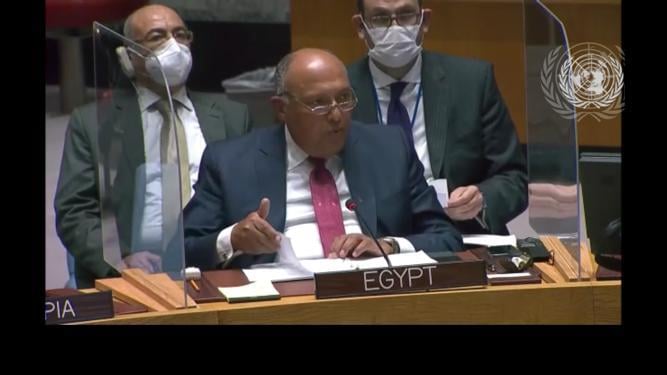Egyptians closely followed the Security Council’s session on Ethiopia’s Nile dam on Thursday, given the central role the Nile plays in the life of the people of this country, being their only source of water.
The interest also boiled down to the existential threat the Ethiopian dam poses to Egypt, its farmland and future development as a country with a population that keeps growing.
These points were highlighted in the speech delivered by Foreign Minister Sameh Shoukri during the session.
Shoukri said Egypt would have to defend its right to life in case the dam caused it harm.
He said the dam represents an existential threat to Egypt’s population of 100 millions.
The dam project also throws light on Ethiopia’s ill intentions towards Egypt and Sudan, the minister said, noting that Egypt’s reaction to Ethiopia’s practice was restrained.
Egypt also committed itself to the initiative by the African Union to resolve the Ethiopian dam crisis, the minister added.
He said Ethiopia’s unilateral decision to undertake the second filling of the dam reservoir ignores the rights of downstream states.
Egypt receives 55.5 billion cubic metres of water from the Nile River annually, whereas it needs 114 billion cubic metres of water for human consumption and irrigation.
It has to import food, equivalent to 34 billion cubic metres of water every year, which costs billions of dollars to partly bridge the gap between water supply from the Nile and domestic water demand.
It also has to treat sewage and depend on underground water to satisfy some its needs.
Most Egyptians know these figures by heart, which was why almost everybody was interested in following up the Security Council session, hoping the international community would take action to commit Ethiopia to suspend its unilateral second filling of the dam reservoir and engage in serious talks with downstream countries.
These two demands were at the centre of the draft resolution submitted by Tunisia to the council.
Public reaction to the Security Council session was full of hope, confidence in the abilities of the administration of President Abdel Fattah el Sisi to protect Egypt from extinction because of the Ethiopian dam, and calls for action in case Ethiopia insists on moving ahead with its intention to deprive Egypt of water.
This hope, confidence and these demands were overtly expressed on social media, casting light on the intense public pressure on Sisi’s administration on the Nile dam issue.
Away from social media, observers expressed hopes that the Security Council would adopt the Tunisian draft resolution, which also calls for reaching a legally-binding deal on the dam within six months.
“Approval by the council members of the Tunisian draft resolution will put things back on track,” Mohamed Rashad, a former intelligence officer, said.
“Adopting the resolution will prevent Ethiopia from procrastinating and wasting time on the road to making the dam a fact on the ground,” a local newspaper quoted him as saying.






Discussion about this post